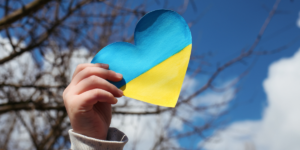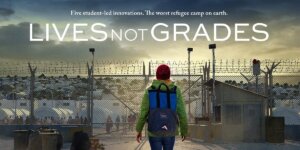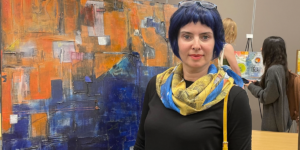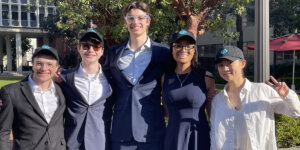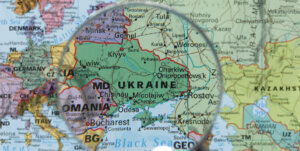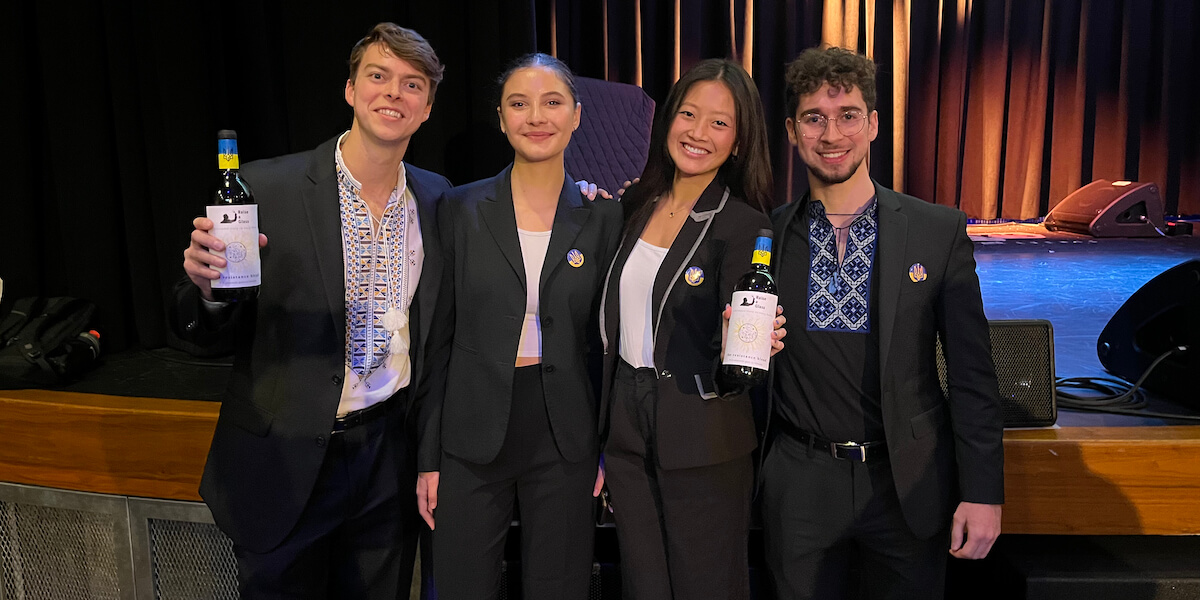
The Raise A Glass Team (Left to right) Nicholas Conner, an MBA student at the USC Marshall School of Business; Kamila Fomin, an international relations major; Mellissa Zhang, who’s majoring in computer science and business administration; and Misha Kuznetsov, a mechanical engineering major (Photo/Courtesy of Nicholas Conner)
As the audience listened with rapt attention, USC student Kamila Fomin described the devastation wrought by Russia’s war against her country.
“Thousands of bombs have been dropped on Ukraine. Eight million have fled the country. Another eight million were displaced within it. Sixty thousand of my people have been injured or murdered,” said Fomin, a Ukrainian national and international relations major.
But instead of buckling under the onslaught, she added, Ukrainians have fought back. Her tone brightening, Fomin enumerated several victories. The Ukrainian Army defended the Azovstal steel plant and took back the city of Kherson. Two civilians smuggled over 10,000 people out of a Russian-occupied city. A Ukrainian man prevented his town’s bridge from blowing up by removing a Russian mine – with his bare hands.
“A resistance was born!” Fomin said.
Ukraine’s bravery, its resistance, serves as the inspiration for Raise A Glass, a burgeoning USC student-led startup that hopes to partner with a small- to mid-sized American winery to create special-edition wines that incorporate augmented reality and storytelling to support Ukrainian wineries devasted by war.
Raise A Glass was one of six USC interdisciplinary teams presenting their product or service ideas at “Innovate for Ukraine Pitch Night.” The event, held Monday, Dec. 12 at Tommy’s Place on the USC campus, represented the halfway point for one of the most unique, immersive courses in academia. The event was attended by prominent members of the Ukrainian community, tech entrepreneurs and founders of social innovation NGOs in Los Angeles.
Innovation in Engineering Design For Global Challenges, now in its fifth year at the USC Viterbi School of Engineering, brings together graduate and undergraduate students from a variety of disciplines and sends them to conduct research in an area of the world experiencing global crisis to design and engineer solutions. The flagship course has since developed into an academic minor open to all majors.
Lives, Not Grades
This year’s class focuses on the millions of Ukrainian refugees fleeing to Romania and elsewhere, as well as the Ukrainians staying behind, who have suffered greatly from Russia’s invasion of their homeland.
“This is about making an impact, using engineering and innovation to do some good in the world,” said Brad Cracchiola, a USC Viterbi lecturer in product development who coined the course’s rallying cry, “Lives, Not Grades.”
From 2018 to 2020, CE 486 focused on the global refugee crisis. USC students visited Moria on the Greek island of Lesvos, at the time Europe’s largest refugee camp, to come up with ways to improve the refugees’ lives. “Lives, Not Grades,” a documentary about the experiences of the inaugural group of students directed by Daniel Druhora, a course instructor and co-founder, won an Emmy Award for the best independent program at the 74th Annual Los Angeles Area Emmy Awards.
In the 2020 – 2021 academic year, the course focused on addressing problems faced by indigent members of the local community during the Covid-19 pandemic. Last year, teams worked together with communities in Alaska’s remotest regions to address sustainability challenges in the final frontier.
Now, Lives, Not Grades is tackling among its greatest challenges: the ongoing conflict in Ukraine and its regional and global ramifications.
In Romania
In late September, 20 USC students landed in Bucharest, Romania’s capital, to begin a 10-day journey that took them to the Romanian-Ukrainian border. They met with refugees, government ministers, mayors, entrepreneurs and leaders of nonprofit groups. Their goal: learn about the needs of Ukrainian refugees who have fled to Romania and come up with ways to help them and other Ukrainians.
Besides Poland, no country has accepted more Ukrainian refugees than Romania. More than one million Ukrainians, according to some estimates, have fled to Romania since the beginning of the war. Most have temporarily resided with Romanian families for a few weeks and returned home when conditions improved. Others have stayed on.
The hardships faced by Ukrainians and the possibility of alleviating their suffering, even in some small way, have inspired the Lives, Not Grades participants. Among them is Misha Kuznetsov, a 22-year-old senior majoring in mechanical engineering and a member of the Raise A Glass team. Born in Ukraine and raised in Iowa, Kuznetsov said he feels extra motivated to do something special.
“It’s really a lot of work, but it’s enjoyable at the same time because you’re working towards something that is potentially going to make a difference,” he said.
The Pitches
After returning to USC, the student teams spent months developing and refining their ideas, which they presented at the recent pitch session.
- Raise A Glass would create a customized blue-and-yellow label with a QR code that customers could scan to see augmented reality stories of Ukrainian resistance, such as the Ukrainian grandmother who brought down a Russian drone by throwing a jar of tomatoes at it. Bottles would sell for about $30 apiece, with a percentage of the proceeds supporting Ukrainians.
- Stitch wants to leverage a telehealth platform that would connect displaced Ukrainian nurses in Romania and elsewhere with Ukrainians in Ukraine. The goal is two-fold: allow qualified medical professionals in the Ukrainian diaspora to earn some extra money, while providing medical advice to sick Ukrainians outside of hospitals, which Russia has repeatedly targeted with missiles.
- Philia would build public art installations in Romania and elsewhere to spark conversations between estranged pro-Russian and anti-Russian family members and friends. The interactive exhibits would feature a series of questions that could serve as the basis for dialogue.
- Ember hopes to build an inexpensive heating device that would keep Ukrainians warm during the brutal winter. Fueled by wood and other materials, it would burn longer and more efficiently than other non-electric units. As part of its war strategy, Russia has destroyed much of Ukraine’s energy infrastructure.
- Allocare would create a digital subscription service that would allow donors to give at regular intervals. Allocate wants to partner with small- to mid-size NGOs to support Ukraine as well as worthy but forgotten causes that have faded from the front page. The aim: have 1,000 donors within six months.
- Frontida Records: Unlike the other presenters, Frontida is a flourishing startup. It provides an electronic records’ solution that organizes medical information in resource-stripped settings across the globe. Frontida is now building an app for a Ukrainian psychologist looking to treat survivors suffering from PTSD using their platform.
Lives, Not Grades participants will return to Romania in early March to test their products and services on the ground. They will then incorporate the feedback they receive into their final prototypes that will be presented at the end of the spring 2023 semester.
“You guys should be proud of yourselves,” instructor David Gerber said at the end of pitch night. “However, you’re really just getting started.”
Published on January 6th, 2023
Last updated on January 9th, 2023




